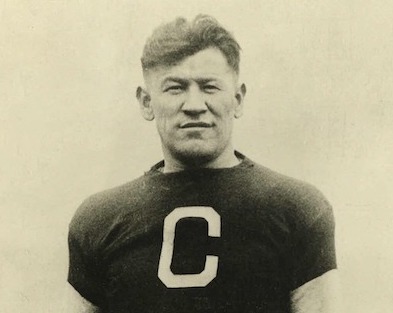
- Details
- By Native News Online Staff
As attention is drawn to Sunday night's Super Bowl between the Kansas City Chiefs and Tampa Bay Buccaneers, Bright Paths Strong says this American ritual we know as the #SuperBowl enters its 55th year this Sunday, but its origins trace back 100 years ago -- to an Olympian, a pioneer of professional football and the country’s first celebrity sports hero, the iconic Native American athlete Jim Thorpe.
Bright Path Strong was created to share and amplify authentic Native American voices and stories, past and present.
So, this Super Bowl weekend, Bright Path Strong is reminding football fans that the legendary Thorpe (Sac and Fox, Potawatomi) was unanimously elected president in 1920 of the American Professional Football Association (APFA), which was the forerunner of the National Football League. Thorpe served as president of the APFA from 1920 to 1921. Incredibly, Thorpe served as president while still an active player for the Canton Bulldogs.Dues back then were only $100 per team. The APFA became the Natonal Football League in 1922.
Before there was the Lombardi Trophy there was the Brunswick-Balke Collender Cup, which mysteriously vanished after the first season.
More Stories Like This
Native News Weekly (August 25, 2024): D.C. BriefsUS Presidents in Their Own Words Concerning American Indians
2026 Native American 40 Under 40 Class Announced
Monday Morning: (January 5, 2026): Articles You May Have Missed This Past Weekend
Native News Weekly (January 4, 2026): D.C. Briefs
Help us defend tribal sovereignty.
At Native News Online, our mission is rooted in telling the stories that strengthen sovereignty and uplift Indigenous voices — not just at year’s end, but every single day.
Because of your generosity last year, we were able to keep our reporters on the ground in tribal communities, at national gatherings and in the halls of Congress — covering the issues that matter most to Indian Country: sovereignty, culture, education, health and economic opportunity.
That support sustained us through a tough year in 2025. Now, as we look to the year ahead, we need your help right now to ensure warrior journalism remains strong — reporting that defends tribal sovereignty, amplifies Native truth, and holds power accountable.
 The stakes couldn't be higher. Your support keeps Native voices heard, Native stories told and Native sovereignty defended.
The stakes couldn't be higher. Your support keeps Native voices heard, Native stories told and Native sovereignty defended.
Stand with Warrior Journalism today.
Levi Rickert (Potawatomi), Editor & Publisher

